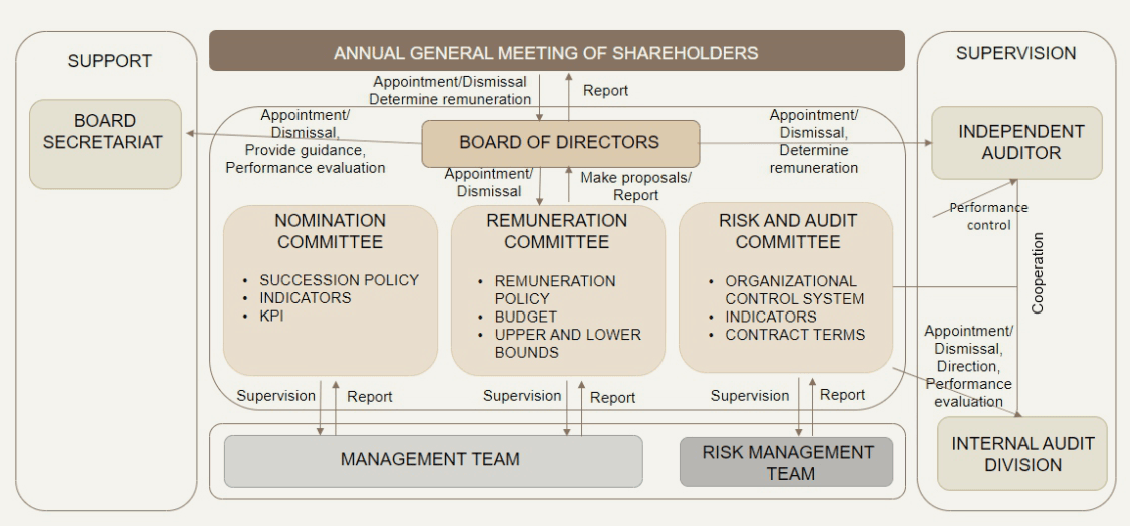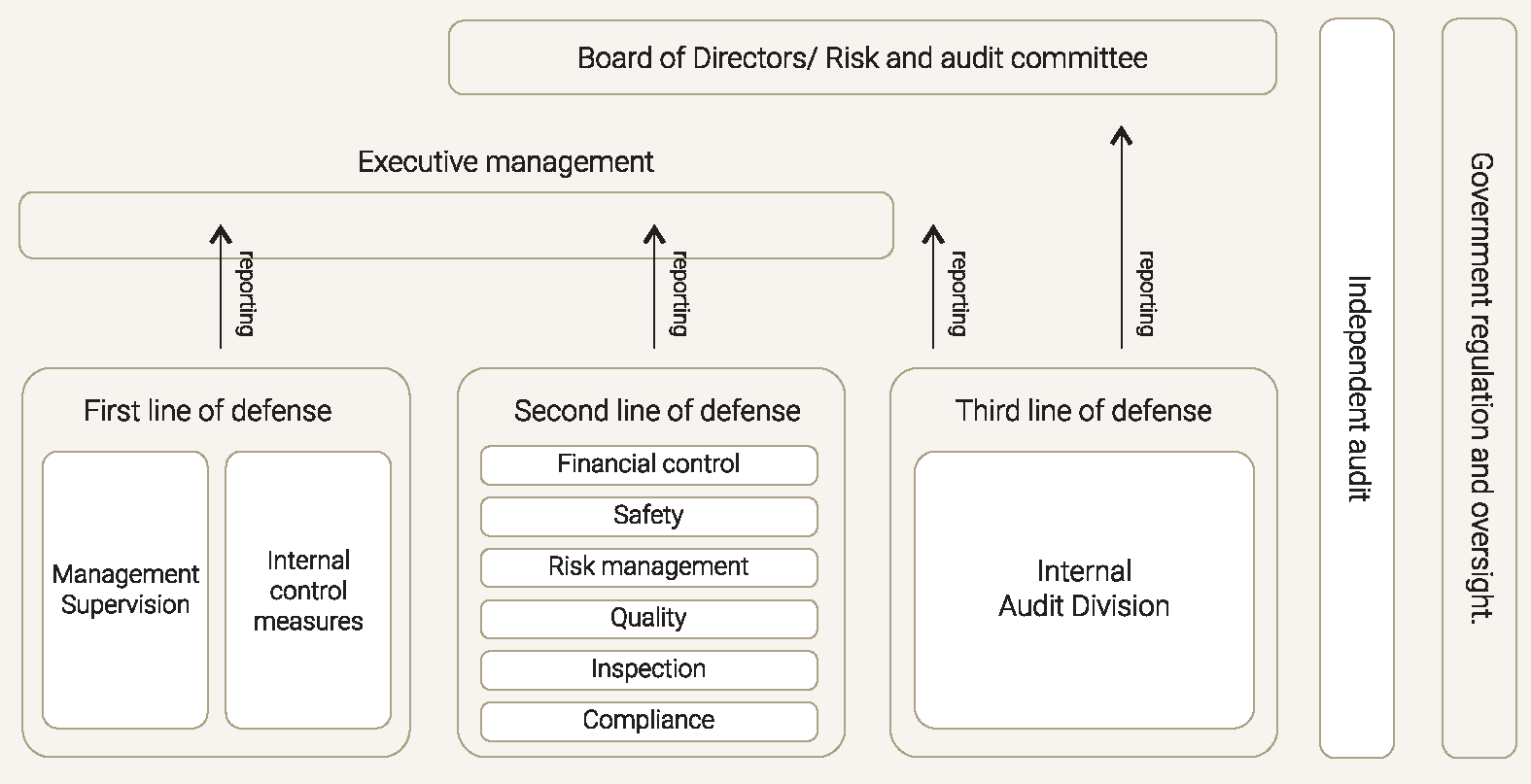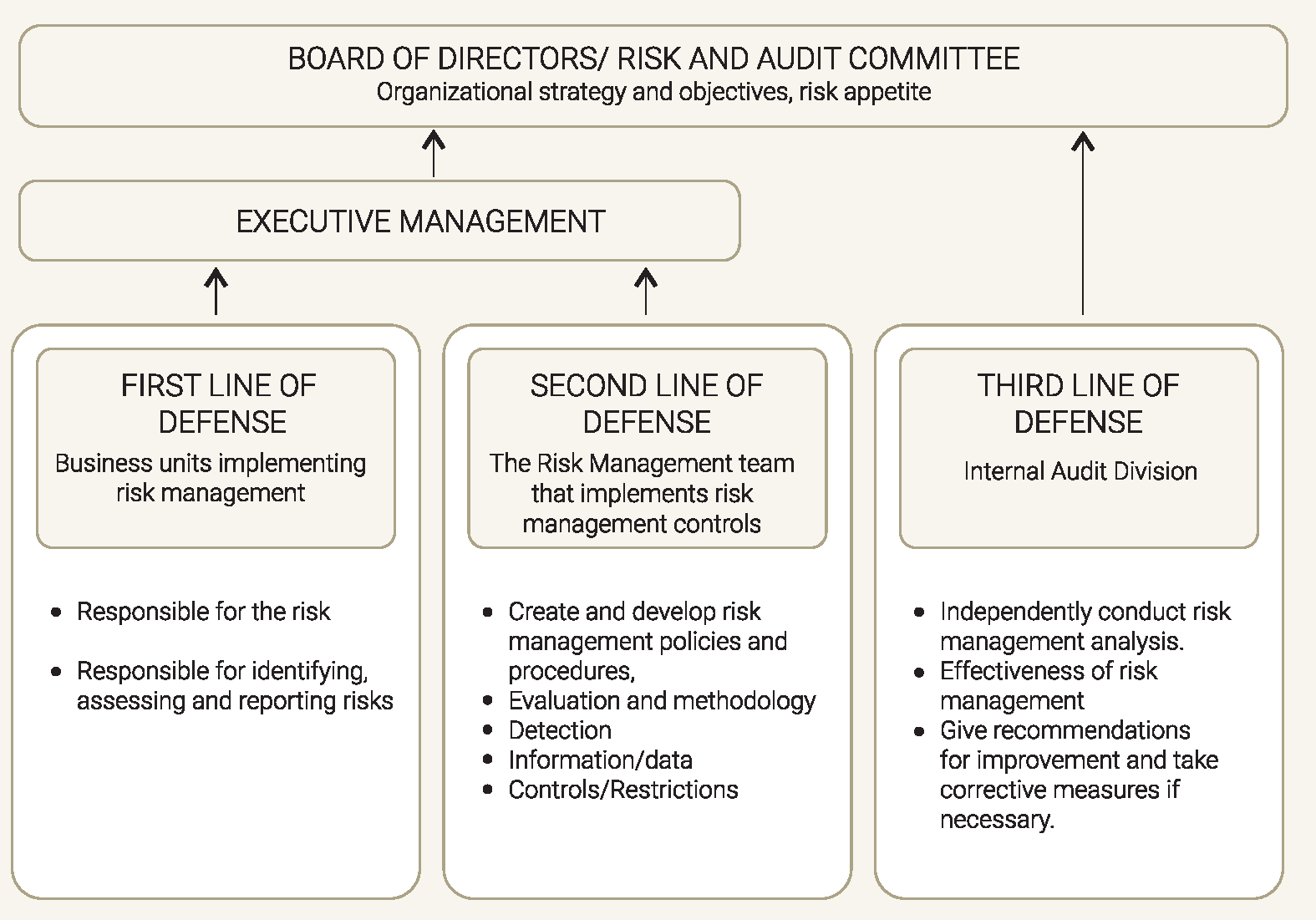Governance structure and operations

GOBI JSC has established a comprehensive corporate governance system that comprises a set of structures and regulations designed to maintain a fair and equitable balance between the interests of shareholders, management, and other stakeholders. Our system is designed to define, implement, and closely monitor the company’s objectives and key areas of activity.As a publicly traded joint-stock company, we continually strive to refine our governance system through our attentive study of the Company Law, the Mongolian Corporate Governance Code, and the best practices of international corporate governance. Our commitment to these laws and regulations is unwavering, as we aspire to be a model company and a trailblazer in corporate governance practices throughout the country.
Organization Chart
INTERNAL CONTROL SYSTEM
Our company has implemented the "Three Lines of Defense" model to enhance its internal control system and optimize operational efficiency. This model serves as a valuable framework for effectively planning, executing, reporting, monitoring, and coordinating critical management functions on a day-to-day basis.

The First Line of Defense consists of the business units responsible for the primary activities of the company. These units diligently carry out daily controls and reporting in alignment with the functions assigned by the Executive Management.
The Second Line of Defense comprises the units that provide support to the company's core operations. These units are responsible for conducting daily monitoring and reporting activities in accordance with the directives set by the Executive Management.
The Third Line of Defense assesses the effectiveness of the internal control system implemented by executive management. It reports findings to the Risk and Audit Committee and provides recommendations for improvement to the Executive Management.
INTERNAL CONTROL POLICY
The Internal Control Policy of the company was approved by the Board of Directors in October 2021. This policy aims to regulate and oversee various aspects crucial to the effective functioning of the company. These include:
Efficient management of activities in compliance with relevant laws and regulations.
• Protection of company assets and ensuring their reliability.
• Prevention, detection, and correction of abuse, fraud, and errors.
• Ensuring completeness and accuracy in accounting.
• Timely, accurate, and factual preparation of operational and financial reports.
• Regular monitoring and management of risks.
Gobi JSC implements internal control through a hierarchical structure involving:
• All employees,
• Unit management,
• Executive management team,
• The internal audit department,
• Risk and audit committee under the board of directors,
• Board of directors, and
• External audit.
The internal control policy document includes the rights and obligations of stakeholders, and the board of directors monitors the company's internal control activities through the Risk and Audit Committee.
INTERNAL AUDIT DIVISION
Purpose
The purpose of internal audit is to safeguard and enhance the value of the organization by assessing the effectiveness of the company's governance processes, risk management, and internal control, while facilitating their ongoing improvement. In our operations, we adhere to the code of ethics, fundamental principles, and international standards of professional practice for internal auditing as approved by the "International Institute of Internal Auditors".
Structure and organization
Internal audit activities are conducted under the oversight of the Risk and Audit Committee, which operates under the authority of the Board of Directors. These activities are carried out by the Internal Audit Department, which consists of a team of 6 professionals, including 1 department head, 2 senior auditors, and 3 auditors. The Risk and Audit Committee is responsible for approving the Internal Audit rules, setting strategic goals, establishing risk-based audit plans, and allocating necessary resources. Additionally, the committee appoints department heads, determines salaries and bonuses, and actively monitors the execution and operation of audit plans to ensure their effectiveness. The Risk and Audit Committee is to safeguard the independence and objectivity of the Internal Audit function.
Scope of operations
The department's scope of operations encompasses ensuring that all company departments deliver quality performance by fulfilling their assigned responsibilities, including decision-making, policy definition, business and support processes, as well as compliance and reporting activities, in order to achieve the company's goals and objectives.
RISK MANAGEMENT
Purpose
The primary objective of risk management is to enhance the company's profitability and optimize the return on capital by identifying, quantifying, and mitigating risks in line with the risk-return ratio. This process plays a pivotal role in ensuring the organization's sustained profitability and establishing a management system that aligns with the company's overarching vision and values.
The implementation of risk management fosters a conducive environment for continuous monitoring and enhancement of the business risk landscape. It enhances employees' understanding and awareness of risks, enables informed strategic decision-making at the management level, aligns with business goals and objectives, and safeguards the organization against potential losses, damages, and disruptions.
Structure and organization of risk management

STAKEHOLDER COLLABORATION
GOBI JSC has incorporated goals and principles into its governance policy to ensure a balance of stakeholder interests in all business activities. As part of this framework, we have identified the company's stakeholders in 2022 and determined their expectations, interests, and levels of influence on the organization's operations. By involving stakeholders in our decision-making processes, we foster a culture of transparency and accountability that promotes long-term value creation and benefits all parties involved.
Throughout the previous year, our primary focus was to promptly deliver accurate information to investors, shareholders, and the broader public. This endeavor necessitated a revision of the "Public Information Procedures." We diligently adhered to the prescribed guidelines and successfully enriched the content of the company's financial results, operational news, and the official website (info.gobi.mn), ensuring consistent dissemination of updates.
Moreover, our unwavering dedication to stakeholder engagement and enhancing the decision-making process led to the recent endorsement of the "Stakeholder Feedback and Complaint Management Procedures." This comprehensive framework now encompasses expanded channels for registering complaints, enabling us to promptly address received grievances. We value stakeholder feedback and actively integrate it into our operations, fostering a culture of collaboration and efficacy.
In our pursuit of a healthy and safe work environment, we prioritize responsible management of our human resources, with a strong emphasis on safeguarding our employees' interests. Our initiatives encompass various aspects, including providing competitive wages and incentives, cultivating a conducive workplace atmosphere, promoting work-life balance, enhancing employee satisfaction, fostering personal growth and development, and augmenting professional competencies. Notably, we have achieved significant milestones in the successful execution of the Sustainable Cashmere tripartite project, which benefits both society and herders.
Looking ahead, our board of directors is fully committed to formulating and endorsing a comprehensive policy that facilitates effective communication and cooperation with stakeholders. Within the framework of this policy, we aim to thoroughly understand the interests and needs of all stakeholders and undertake tasks that maintain a harmonious equilibrium among them.